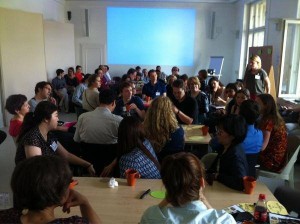Starting the OpenGLAM local group for Germany – event report
On the morning before the start of the Open Knowledge Festival, a group of nearly 60 open culture enthusiasts from all over the world gathered at the Wikimedia offices in Berlin to discuss the situation around open cultural data in Germany and to start up a local German OpenGLAM group. The day began with a brief overview of the OpenGLAM initiative:
Helene Hahn (Open Knowledge Foundation Deutschland) then went on to present the results of the first German cultural hackathon, Coding da Vinci. She described the winning projects that were selected from a total of 17 developed projects – definitely an impressive first edition of this hackathon series!
The final lightning talk was given by Daniel Mietchen of the Museum für Naturkunde, Berlin. He gave an overview of the ongoing collaborations in the GLAM-Wiki sphere focused on scientific data: the basis of his talk is available through his Wikipedia page.
Starting the local OpenGLAM group for Germany
With such a large group of participants, structuring the debate on the current situation around openness in Germany was not an easy task. Everyone was asked to share what they see as the most positive contribution that Germany has made towards opening up cultural data, as well as the three most pressing issues which stand in the way of further opening up. All input was placed on two bulletin boards, and the issues were grouped together in five clusters that a local OpenGLAM group for Germany could focus on in the start-up period:
- Data quality
- Copyright / licenses
- Access to and use of data
- Supporting cultural heritage institutions
- Network: sharing use cases & best practices
Finally, for further inspiration there were talks from two other local OpenGLAM groups: Opendata.ch (Switzerland, presented by Beat Estermann) and AvoinGLAM (Finland, presented by Sanna Marttila), both of which have managed to set up a good network and working structure within their countries, as well as some impressive achievements such as hackathons and masterclasses around open cultural data.
Following these talks, the groups started a first brainstorm on what kind of activities the German OpenGLAM group could start for each of the five topics. Since time was running out, this will be continued online in the future – a German OpenGLAM network mailing list has now been set up to discuss what the next steps of the working group might be. Besides discussions, subscribers will get information about dates and outcomes of working group meetups, interesting links and event hints around open cultural data in Germany. More information (in German) will also be shared through http://okfn.de/openglam/.
Many thanks to Wikimedia Deutschland for the great hosting of this event, and for all those interested in joining the German OpenGLAM group, please sign up for the OpenGLAM-de mailinglist to stay informed!

